More than a month ago, as most pundits were already ignoring Elizabeth Warren’s candidacy and discounting Bernie Sanders as having an impossibly low ceiling, I noted that this sort of thinking was dangerously naive. Using the 2016 Republican primary as a parallel, I pointed out the value of the much-derided use of “tracks” to analyze the race: since Trump and Cruz were consistently receiving over 50 percent of the collective GOP support, it was simple—so long as you weren’t rigidly wedded to out-of-date notions of electability—to predict that one of them would earn the nomination in the anti-establishment track. Similarly, in the case of the 2020 Democratic primary, I suggested that we should pay attention to the cumulative tally of Warren and Sanders to assess the likely direction of the Democratic nomination.
As for Trump’s electability, I’ve said over and over again that, while most politicos underestimated Trump’s chances in 2016’s primary and general election, they’re dramatically overstating them now, once again over-learning the lessons of the past election without accounting for new realities.
While it’s just one early data point, a new Emerson poll from Wisconsin seems to back up this analysis.
First, Sanders is exploding with a whopping 39 percent support. In second place is Joe Biden with 24 percent. While it’s true that Biden has not yet formally declared his candidacy, it’s not as if he’s not a known quantity, either. You either like Joe Biden or you don’t; your opinion isn’t likely to change based on new information. Meanwhile, Warren is still performing very strongly, with 14 percent despite having been the first major candidate to enter the race. All others trail well behind in single digits—including neighboring Amy Klobuchar with only 4 percent.
Most notable from this survey is the combined numbers for Sanders and Warren. Yes, in previous polls a significant number of (presumably older white) voters liked both Sanders and Biden as their top two for reasons that are likely more deplorable than ideological. But Warren’s vote total is not so easily dismissed: Warren has a very particular anti-plutocratic, anti-establishment brand. While some (small) number of Sanders’ supporters may flee to the next nearest white male if he collapses, Warren’s are quite unlikely to do so. Her supporters will shift ideologically to the next most progressive candidate.
In terms of electability, Trump performs poorly against Biden, Sanders, and Warren, He does no better than hitting even against the others: Sanders and Warren both beat Trump by four points in Wisconsin, and Biden beats him by 8.
As for ideology? Democratic primary voters show a marked preference for a shift to the left:
Democratic primary voters appear to be looking for a candidate on the left in terms of policy. Twenty-four percent (24%) of Democratic respondents reported they want policies that significantly move the party to the left; 31% want policies slightly to the left. 30% said they want party policies to stay as is – with only 15% looking for the party to move to the right. Even with this desire for a move to the left, 84% of Democratic primary voters either somewhat, or strongly agree, that the Democratic Party represents their interests. Only 8% of respondents disagreed with that statement.
Of course, it’s just one poll in one state But I suspect that Wisconsin probably isn’t too far off from Michigan or Pennsylvania in this regard. If these early results hold, Warren and Sanders still look like fairly good bets to win the nomination and to defeat Donald Trump in the general, assuming that he’s even still a candidate by then.



